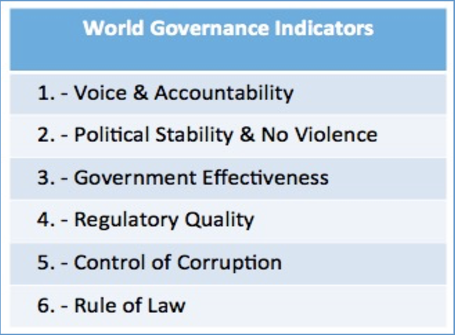Author: Daniel Kaufmann
Affiliation: The Global Economy and Development Program/Brookings
Organization/Publisher: The Brookings Institution
Date/Place: September 30, 2021/Washington, DC, U.SA
Type of Literature: Article
Number of Pages: 9
Keywords: Governance Measuring, Worldwide Governance Indicators (WGI), Governance Challenges, Governance Evolution.
Brief:
Daniel Kaufmann examines governance and its measuring and quantification during the last 25 years and the lessons from this experience. Kaufmann highlights a research initiative that has sought to define and measure governance since 25 years ago, which has been called ‘Worldwide Governance Indicators ’(WGI). The WGI is composed of a set of indicators that examines six dimensions of governance which are “Voice and Accountability, Political Stability and Absence of Violence/Terrorism, Government Effectiveness, Regulatory Quality, Rule of Law, and Control of Corruption”. Through the examination of the WGI over the last 25 years, Kaufmann introduces some findings and comments about governance. He underlines some diverse governance challenges among rich countries or regions. Contrary to the common generalization about governance quality across income groups and regions, there are considerable variations across countries within the same region or income groups; additionally, there are variations among the various dimensions of governance in the same country or region. While rich countries show a higher standard of governance on average, there is still a significant variance among countries in the same group or in other groups. Moreover, the governance deficit across various indicators among rich countries is notable. Kaufmann, then, elaborates on the evolution of governance over time in a couple of points. First, substantial changes in governance take place over time. Although many countries show stable records of governance, either high or low, a considerable minority expresses large changes which could be in both directions. Second, he indicates that governance evolution is nonlinear which means that after stable records of governance over years, considerable changes could rapidly take place over a few years in both directions, aside from showing reversals. Finally, Kaufmann questions whether the lower governance dimension would move governance and development backwards in a country. Another question introduced by Kaufmann examines the relation between global security and development since the good governance models are not the most powerful. To sum up, the examination of WGI indicates that good governance standards could be reached within a generation or even less. Additionally, high standards of governance have been maintained for decades in many countries around the world. Kaufmann suggests that these questions and others require more reliable research strategy that depends on precise data collection and use of relevant data to help respond to such critical questions.
By: Yomna Süleyman, CIGA Research Assistant




